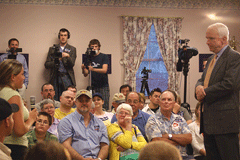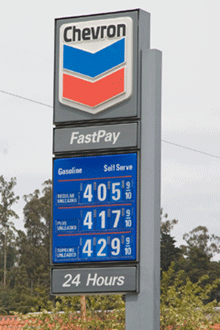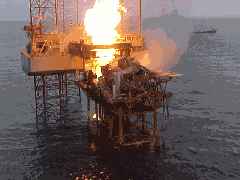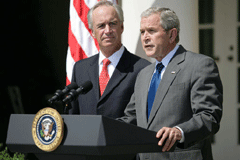Drilling for Votes
Air Date: Week of June 20, 2008

Seantor McCain fields a question about global warming while campaigning for the Republican primary in Merrimack, New Hampshire. (Photo: Marc Nozell)
Voters want to know what the presidential candidates will do about gas prices. Republican contender John McCain says he'd put more oil drills on the U.S. coast by lifting a moratorium on offshore drilling. Living on Earth's Jeff Young drills down into the offshore drilling debate.
Transcript
GELLERMAN: The price of gas is soaring just as the race for the White House is heating up – putting oil front and center as a Presidential campaign issue. For 27 years the U.S. has banned drilling for oil and gas off the continental coast, and Republican Senator John McCain supported the moratorium, but now, he’s says he’s reconsidering his position. Living on Earth’s Jeff Young reports on petroleum politics and McCain’s electoral chances in November.
YOUNG: When Senator John McCain last ran for president in 2000 he opposed expanding offshore drilling—he called it a giveaway to special interests. The price of a gallon of gas during that campaign was about a dollar and a half. This is John McCain at four dollars a gallon.
MCCAIN: We have proven oil reserves of at least 21 billion barrels in the United States, but a broad federal moratorium stands in the way of energy exploration and production. And I believe it’s time for the federal government to lift these restrictions and put our own reserves to use.

Seantor McCain fields a question about global warming while campaigning for the Republican primary in Merrimack, New Hampshire. (Photo: Marc Nozell)
[CHEERS]
YOUNG: The oil-friendly crowd in Houston cheered. But McCain’s change of heart is a politically risky move that raises questions about his commitment to environmental protections in the face of economic pressure. McCain detailed his position at a press conference in his campaign’s headquarters in Virginia. There are two moratoria, one by the president, another from congress that cover most of the Atlantic and Pacific coasts. McCain wants to end them and give states control.
MCCAIN: I don’t want to dictate to the states what they should do, but I think that the states can be provided with additional incentives such as a greater share of revenues. So, I do believe that there are places in the world that we should not drill, but I certainly think there are areas off our coast that should be open to exploration and exploitation and I hope we can take the first step by lifting the moratoria in order to do so.

As gas prices continue to rise, political support for offshore drilling is growing. (Photo: Greg Woodhouse)
YOUNG: It’s not clear how many states might choose drilling. Virginia’s legislature and both the state’s U.S. senators support the idea. But most coastal states remain opposed. That makes it hard to guess how much oil or natural gas might be produced. Environmental groups say it also raises thorny questions about safety and who would suffer in an oil spill. Cathy Duvall is with the Sierra Club, which has endorsed McCain’s democratic opponent, Barack Obama.
DUVALL: The way that the tides and the currents work, if there were an accident off that shore it actually wouldn’t come onto shores of Virginia it would come on to New Jersey. So a state would be making a decision that involves some risks yet another state would bear the brunt if something were to happen.
YOUNG: Duvall says. And it’s unlikely that production from new leases would have any near term effect on gas prices. Oil industry experts agree it would take at least five to 10 years to produce new offshore oil. Still, the industry’s trade group, the American Petroleum Institute, welcomes McCain’s announcement. API’s senior economic advisor, Rayola Dougher, brushes aside any safety concerns.
DOUGHER: Because the technology is such that they have these safety valves in place if one pipe breaks the other one’s there to close it off. You do not have the spills that happened decades and decades ago—that is not possible with today’s technology. I think this would be a great move and it’s about time, it really is.

An oil rig aflame - environmentalists say accidents like this demonstrate that offshore drilling is damaging and dangerous. (Courtesy of the U.S. Department of the Interior)
YOUNG: It’s not necessarily that great for a candidate to be considered a friend of your industry these days, is it?
DOUGHER: Probably not. It takes a lot of guts! Ha ha.
YOUNG: McCain risks seeming too cozy with Big Oil and with President George Bush. The day after McCain’s energy speech the president echoed his call, challenging congress to drop the offshore drilling moratorium.
BUSH: Americans will rightly ask how high oil, how high gas prices have to rise before the democratic controlled congress will do something about it.

U.S. Interior Secretary Dirk Kempthorne (left) with President George W. Bush in the White House Rose Garden as he calls on Congress to expand domestic oil production. (Photo: Luke Sharrett, Courtesy of the White House)
YOUNG: McCain has hoped his early stand for action on global warming would set him apart from the unpopular president. This new campaign ad plays up McCain’s maverich status.
AD SOUND: John McCain stood up to the president and sounded the alarm on global warming five years ago. Today he has a realistic plan that will curb greenhouse gas emissions.
YOUNG: But the drilling issue could put McCain closer to his party’s pro-drilling wing, epitomized by New Mexico Senator Pete Domenici.
DOMENICI: It’s terrific. Offshore drilling is showing that he wants to produce some American energy. Because it’s ours. And we gotta be on oil and gas for a long time no matter what so why not use our own? He’s doing it the same way we recommended.
[NOISE OF CONGRESS HALLS]
YOUNG: McCain’s environmental supporters insist he’s still his own man on energy policy.
JENKINS: I think to suggest that his policies would be similar to the Bush administration or to some of the Republican leaders in Congress, is just silly.
YOUNG: That’s Dave Jenkins with the group Republicans for Environmental Protection, which endorsed McCain and now finds itself in a tichlish spot. Just a week before McCain’s drilling speech, the group argued that the oil industry has plenty of offshore leases it’s not using.
JENKINS: Our organization has not been big fans of offshore drilling. However it’s very clear that the public has an incredible concern about energy prices and everyone is struggling to find the right balance. What Senator McCain is doing is trying to find a good, balanced policy.
YOUNG: McCain’s also making some of his allies in important battleground states squirm a bit. Florida has long fought to protect its beaches and ocean views form oil spills and platforms. But Florida Republican Senator Mel Martinez says high-energy prices make McCain’s pro-drilling argument more attractive.
MARTINEZ: I’m kind of agreeing with him. So maybe things are changing in that regard. And, I think that four dollars a gallon has done that.
YOUNG: McCain hopes to tap into voter discontent on high gas prices. But it could come at the expense of his environmental appeal. For Living on Earth I’m Jeff Young in Washington.
Links
Energy Information Agency analysis of offshore resources, showing limited impact on gas prices
Sen. McCain’s speech in Houston June 17
President Bush’s comments on offshore drilling June 18
Mineral Management Services overview of offshore drilling safety and spills
Living on Earth wants to hear from you!
Living on Earth
62 Calef Highway, Suite 212
Lee, NH 03861
Telephone: 617-287-4121
E-mail: comments@loe.org
Newsletter [Click here]
Donate to Living on Earth!
Living on Earth is an independent media program and relies entirely on contributions from listeners and institutions supporting public service. Please donate now to preserve an independent environmental voice.
NewsletterLiving on Earth offers a weekly delivery of the show's rundown to your mailbox. Sign up for our newsletter today!
 Sailors For The Sea: Be the change you want to sea.
Sailors For The Sea: Be the change you want to sea.
 The Grantham Foundation for the Protection of the Environment: Committed to protecting and improving the health of the global environment.
The Grantham Foundation for the Protection of the Environment: Committed to protecting and improving the health of the global environment.
 Contribute to Living on Earth and receive, as our gift to you, an archival print of one of Mark Seth Lender's extraordinary wildlife photographs. Follow the link to see Mark's current collection of photographs.
Contribute to Living on Earth and receive, as our gift to you, an archival print of one of Mark Seth Lender's extraordinary wildlife photographs. Follow the link to see Mark's current collection of photographs.
 Buy a signed copy of Mark Seth Lender's book Smeagull the Seagull & support Living on Earth
Buy a signed copy of Mark Seth Lender's book Smeagull the Seagull & support Living on Earth

